It may sound counterintuitive, but customers aren’t in the market for products or services. They’re in the market for relationships with enterprises that know them: their pain points, their markets, their needs. They want to be understood by partners who put their situation at the center of each engagement. They want to know they’re working with enterprises that can deliver the tailored solutions they need to solve today’s challenges and anticipate those they haven’t foreseen.
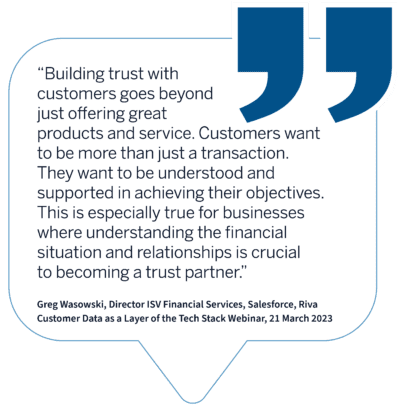
In short, customers want to work with enterprises whose customer-facing teams they can trust to look out for and protect their interests—giving them the confidence they need to put their reputations on the line by recommending new product and service purchases to their c-suite, peers, and teams.
It’s a tall order. But in a competitive marketplace where enterprises are increasingly invested in the pursuit of customer attention and loyalty, customer trust represents table stakes. That’s why so many companies invest in the concept of a “single source of truth”—think CRM platforms like Salesforce, augmented by revenue data ops solutions like Riva—to ensure go-to-market teams are working with a complete picture of each customer’s journey with the enterprise. And for enterprises unwilling—or unable—to demonstrate their customer-centric commitment by investing in trustworthy CRM data, success is likely to prove increasingly elusive.
So What Do Customers Expect?
In their desire to be known and seen by the companies they’re considering, customers— consciously or unconsciously—make a deal: they’ll share their data in exchange for benefits experienced during a rewarding customer journey.
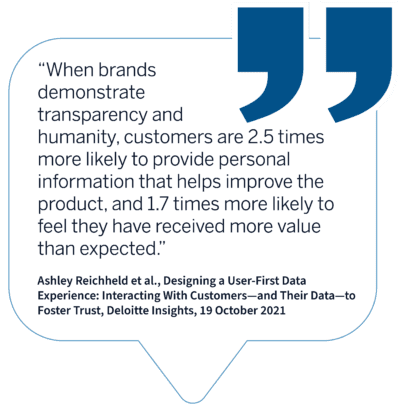
When this give-and-take works, a cycle is set in motion, and customer trust grows. They give information. You use it—transparently, according to established terms—to consider and address their needs. Then, throughout what are typically multi-touch engagements, you and your enterprise can utilize the high-quality CRM data you’ve gathered, governed, and judiciously shared with your go-to-market teams to continually nurture the relationship.
This last part about the use of high-quality customer data? It’s vitally important to the trust cycle—and it’s where the enterprise of the bargain often comes up short. We’ll be coming back to it shortly, but first…
Why Do They Expect It?
Customer expectations are borne of experience. And all it takes is one experience to change the game. Thus, every time your customers and prospects have a new engagement with a company that over-delivers on their expectations, that expectation is then applied to every interaction thereafter.
So, if your competitor makes excellent use of the customer data they’ve gathered to deliver a standard-setting customer experience, you’d better have your A-game ready when they turn their attention to you. That’s what “customer-centric” is all about: understanding, articulating, and delivering what the customer needs when—or even before—they need it. In today’s highly competitive, highly commoditized business environment, leveraging customer data is just as—and likely more—important than the product or service you aspire to sell.
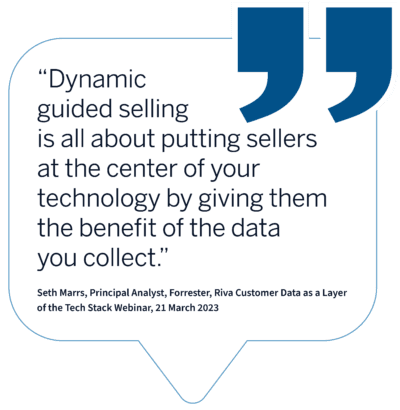
Why CRM Data Trust Is Essential to Customer Trust
All things being equal, the customer is making their purchasing decision based on their ability to trust their relationship with you and your enterprise. But customer trust isn’t based on shuck-and-jive. It’s based on substance: they can only trust you if you can trust the revenue and communications data your enterprise gathers, curates, and makes available to customer-facing teams during each customer engagement, typically via CRM. So, while accurate, complete data gathering is important, it will fall short if that data isn’t carefully, comprehensively unified, governed, and delivered to the right people on your team—where and when they need it.
With that in mind, here’s a straightforward approach to building an effective, sustainable CRM data trust lifecycle:
1. Fuel go-to-market team confidence with a single source of high-quality customer data
We entrust customer interactions to our go-to-market teams because we recognize the importance of relationship building to customer lifetime value. But unless those interactions can rely on real-time access to high-quality, customer-specific data, customer-facing teams are forced to either (a) use the inaccurate, incomplete, or duplicative data available to them; or (b) start each customer interaction from scratch by gathering the same data customers have likely already provided.
The most effective antidote to what might be called “rogue” or “gut-level” engagement is to embrace technologies like revenue data operations that automatically unify and govern the raw revenue and communications data pertinent to each customer interaction, then distribute it via a single, trusted source of truth—typically CRM.
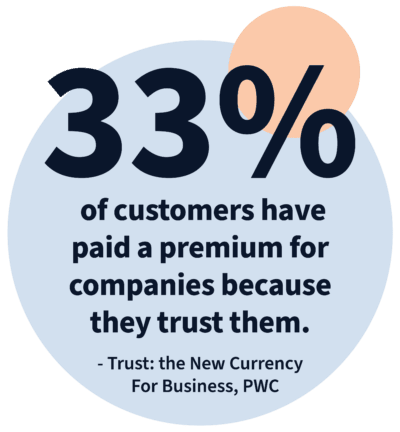
2. Reward CRM data confidence with success
When go-to-market teams have single-source access to complete, well-governed customer data through their CRM, their trust in that source—and that CRM data—climbs. As that trust climbs and go-to-market teams’ reliance on it grows, they’ll be better positioned to meet customer expectations by delivering informed counsel, making tailored recommendations, and proposing on-point solutions that address specific customer needs. In short order, these customer-centric engagements tend to produce results—transactions—that further instill team confidence in the CRM data used to build relationships and sales.
3. Recognize success to encourage a culture of good customer data hygiene
It’s natural to focus on things that need improvement. But when you’re working to sustain customer data quality, it’s equally important to acknowledge success—and highlight its association with a culture that embraces good data stewardship. As go-to-market teams recognize that correlation, they’re more inclined to appreciate their roles in archiving the high-quality CRM data they rely on to build and sustain strong customer relationships that lead to high customer lifetime value. While revenue data operations go a long way toward resolving issues with inaccurate, missing, and duplicate data, the importance of team member CRM adoption—and consistent data practices— is still critically important.
4. Reinforce the importance of customer-centric engagement to build customer confidence in the enterprise
Like customer data stewardship, enterprise focus on customer-centric—not product-centric—customer interactions rely on go-to-market team adoption. That, in effect, is the benefit of ready access to the kind of trusted CRM data revenue data operations can enhance by ensuring its accuracy, completeness, security, and compliance. Working with this trusted data, go-to-market teams can build and support customer confidence that the information they’re sharing with the enterprise is being well-used—and that they’re working with professionals who are attuned to their needs.
5. Translate CRM data trust to customer trust
Customers expect that the data they provide to enterprises will be used to make their experience better. As the enterprise honors that expectation by leveraging that customer data to provide useful, reliable counsel, customers gain confidence in the enterprise, its people, and its products and services. The relationship is further strengthened when customers feel their data is safe and its use complies with regulatory use requirements and the terms of privacy agreements.
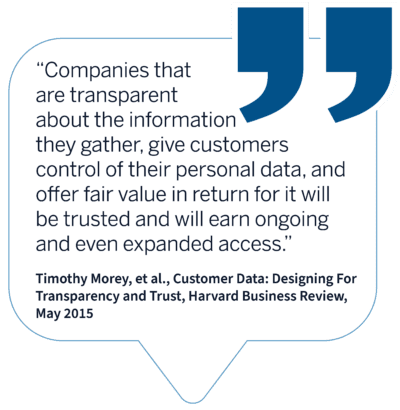
When this give-and-take works, it forms a virtuous cycle, where customers trust you with their data, and you honor that trust by using it to their benefit. If they’re giving you data and you’re not using it—or you’re misusing it—that cycle breaks. That’s why revenue data operations solutions like Riva are so important. By automating revenue and communication data unification, governance, and distribution, enterprises can avoid the omissions, duplications, and errors that pollute CRM data, impede productive engagements, and dissuade customers from providing more of the details necessary to sustain a relationship that works—and thrives—in both directions.
Conclusion
It’s one thing to understand the integral relationship between trustworthy CRM data and customer trust in the enterprise. It’s another thing to see how high-quality data can impact real-world business performance. In a Total Economic Impact study commissioned by Riva, Forrester Consulting used data from Riva customer interviews to create a composite FinServ enterprise that demonstrated a 352% ROI for Riva revenue data operations—and efficiency and productivity enhancements resulting in $7.5M over three years. We encourage you to download the TEI report today—and see how an investment in Riva revenue operations could help your enterprise realize the transformative benefits of trustworthy data.

